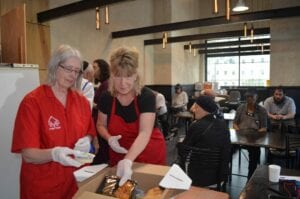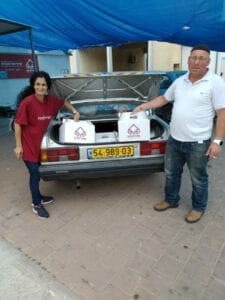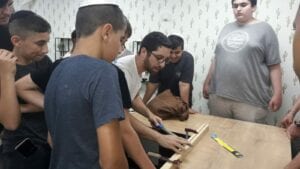A typical summer vacation usually entails some sort of getaway, whether it be a local one or a journey an ocean away. But for those looking to take part in something bigger than themselves and give back to those in need, Israel is a rich place for volunteer opportunities.
To that end, Meir Panim offers many ways for both tourists and local Israelis to give back to those less fortunate. For the former, “it’s a super meaningful and informative way to learn about local culture. You can visit popular sites, but to really understand a place you should appreciate the local way of life,” explained Mimi Rozmaryn, Meir Panim’s Director of Global Development. Giving back to the community is equally powerful for those who live in Israel, as well. For locals, volunteering can offer a window into a subset of a community that they otherwise wouldn’t be exposed to. Through volunteering, they can gain a better understanding of their own backyard and appreciate it in a new light.
Whether one volunteers as a one-off vacation experience or decides to contribute one evening a week to a certain cause, here are the many different ways one can volunteer within the Meir Panim network that is both fulfilling and fun.
Restaurant-Style Soup Kitchens:
The sad reality about Israel is that an unconscionable amount of people simply can’t afford to put food on the table. Meir Panim understands this and as a result, offers Restaurant-Style Soup Kitchens across the country. Those in Tzfat, Jerusalem, Tiberias, Or Akiva, and Dimona can pitch in to help serve those who come to these facilities. For some, this is the only hot meal they’ll get all day.
But the dire circumstances of the needy individuals contrast to the feel of these soup kitchens. That is because they’re set up like any regular restaurant. A person in need can come, order their food and no questions are asked. Of course, poverty doesn’t discriminate and, as such, these kitchens see Jews, Muslims, and Christians of all ages. A visit to a Meir Panim soup kitchen, then, is a glimpse into the kaleidoscope that is multicultural life in Israel. These soup kitchens offer a climate of inclusiveness and positivity where nobody feels judged and where every volunteer can feel comfortable rolling up their sleeves and getting to work.
Meals-on-Wheels:
Of course, not everyone is able to visit these Restaurant-Style Soup Kitchens. For the elderly and disabled, even venturing out of their homes is a challenge. Meir Panim, though, understands that they still deserve a nourishing meal and a full stomach. WIth the Meals-on-Wheels program, freshly packaged meals are delivered to homebound individuals on a daily basis.
This initiative is made possible because of dedicated volunteers. These volunteers go from home to home and lovingly deliver the meals to each person or family. They also spend some time talking to them to see if there’s anything else they need, like medication, and even check to see if their homes could use repairs.
For many people enrolled in the Meals-on-Wheels program, their relationship with the volunteer is their only connection to the outside world. Volunteers are also expected to report if the individual’s health is in decline, making their contributions not only a mitzvah but a potential act that may save someone’s life.
Mini Shuk Experience:
For both tourists and locals, sometimes there’s nothing more invigorating than visiting a bustling marketplace. “Every Tuesday at Or Akiva, miracles happen,” Rozmaryn said. As such, every week Meir Panim hosts what it calls a “mini shuk.”
There, the freshest fruits and vegetables donated by local farmers are on offer for those who need them – free of charge. Volunteers carefully package and distribute the goods and have the opportunity to get to know the local residents. “It’s really uplifting to see this every week and seeing everyone come together is very cute,” she added.
Holocaust Survivor Day Program:
Out of the 200,000 remaining Holocaust survivors living in Israel today, a quarter of them live in poverty. Since Meir Panim is dedicated to ensuring that survivors are able to live the rest of their days in dignity, they’ve launched a regular program.
In Dimona 3 days a week, Holocaust survivors spend quality time with other members of the local community to make them feel a little less alone. During this time, they tell stories, are provided with breakfast and lunch and, thanks to a joint effort with MASA Israel, are also paid a visit by local high school kids.
Spending time with the next generation has made many of the survivors feel a little younger at heart and has allowed the children to understand the many sacrifices that generation made for the entire country.
After-School Youth Centers:
For those following the news, it’s no secret that cities like Sderot along Israel’s border with Gaza have had a trying year. Hamas has spent the bulk of 2019 launching flammable objects and rockets across the border, forcing many local residents to spend much of their days in local shelters.
For at-risk teens who crave spending time outside with their friends, this year has been a challenge. In response, Meir Panim offers three After-School Youth Centers in Sderot neighborhoods where they can relax, have a bit of fun and attempt to forget about their day-to-day stresses.
Teens participate in leadership seminars, woodworking classes, Zumba and therapy sessions. Volunteers who want to pitch in can teach a class, run a workshop or just spend time with these kids, many of whom struggle from ongoing PTSD.
Whichever program one decides to join, they can rest assured that they’re not just helping out an organization that supports Israel’s needy but are also fulfilling the mitzvah of Tikkun Olam (repairing the world). Now, who wouldn’t want to be a part of that?



